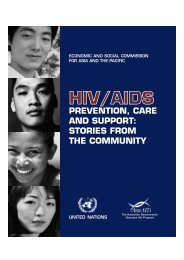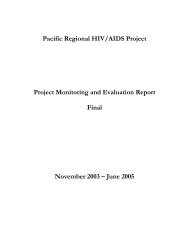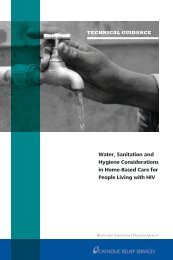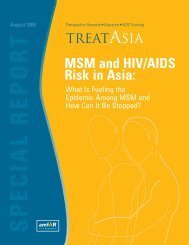The State of Business and HIV/AIDS (2006) - Booz Allen Hamilton
The State of Business and HIV/AIDS (2006) - Booz Allen Hamilton
The State of Business and HIV/AIDS (2006) - Booz Allen Hamilton
You also want an ePaper? Increase the reach of your titles
YUMPU automatically turns print PDFs into web optimized ePapers that Google loves.
3 Baseline: Current <strong>State</strong> <strong>of</strong> <strong>Business</strong> <strong>and</strong> <strong>AIDS</strong><br />
31<br />
A mining operator estimated that worker deaths from <strong>AIDS</strong>related<br />
causes cost the firm $18,500 per employee, as well<br />
as an increase in production costs.<br />
3.4.4. Care, Support, <strong>and</strong> Treatment<br />
Eighty-four percent <strong>of</strong> companies surveyed ensure<br />
that their workers have access to <strong>HIV</strong>/<strong>AIDS</strong><br />
treatment—via health insurance, cost sharing, or<br />
other mechanisms (figure 18).<br />
<strong>The</strong> challenge comes for companies when access<br />
to treatment is not locally available or there is<br />
no insurance mechanism that companies can<br />
leverage to fund treatment in a particular region.<br />
Currently, the business case is clearest in Africa,<br />
where 71 percent <strong>of</strong> companies versus 36 percent<br />
<strong>of</strong> companies overall fully subsidize <strong>HIV</strong> treatment<br />
for employees. Some companies have taken steps<br />
to fund infrastructure (hospitals or clinics) or have<br />
partnered with pharmaceutical companies to<br />
provide access to treatment. Some <strong>of</strong> those that<br />
have provided this initial investment are now looking<br />
to co-invest with public organizations to ensure<br />
access to treatment to the wider community.<br />
Care <strong>and</strong> support is critical for the workplace when<br />
responding to <strong>HIV</strong>/<strong>AIDS</strong> as mechanisms need<br />
to be in place to foster an open, accepting, <strong>and</strong><br />
supportive environment for workers to disclose their<br />
status <strong>and</strong> seek treatment. Where health services<br />
are available in the workplace, appropriate support<br />
<strong>and</strong> treatment should be provided. Where these<br />
services are not available, workers should be linked<br />
to those services available in the community.<br />
Forty-five percent <strong>of</strong> companies surveyed are<br />
extending their programs to provide access to<br />
treatment for spouses <strong>and</strong> all registered/legal<br />
dependants (figure 19). <strong>The</strong> majority <strong>of</strong> those<br />
extending their programs are in Africa, where they<br />
recognize that productivity can also be affected<br />
when workers have to become caregivers for sick<br />
relatives. Some companies are also working to<br />
extend access to treatment in broader community<br />
through partnerships.<br />
Despite this positive response to providing access<br />
to treatment, a number <strong>of</strong> companies interviewed<br />
expressed concern with respect to the cost <strong>and</strong><br />
effectiveness <strong>of</strong> treatment. Some described<br />
concerns about the number <strong>of</strong> dependents a worker<br />
may have <strong>and</strong> the risk <strong>of</strong> that worker sharing his/her<br />
medication among relatives or selling it. Others<br />
reported that some <strong>of</strong> their workers continued to<br />
go to traditional healers rather than seek treatment<br />
in the mainstream health system, so would not<br />
necessarily accept treatment. Another concern was<br />
that once treatment started, it must continue, but<br />
what if the worker is fired, leaves, or is transferred<br />
to an area with no treatment? Finally, companies<br />
with medical staff on their programs discussed the<br />
need to ensure quality treatment <strong>and</strong> highlighted<br />
the concern that the focus will need to extend from<br />
reducing the cost <strong>of</strong> first-line treatments to other<br />
treatments that are much more expensive.











